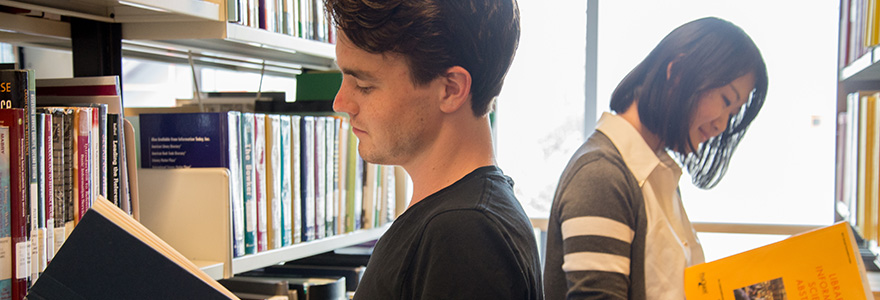Programs
Contact
MLIS General Inquiries
mlisinfo@uwo.ca
519-661-4017
FIMS Graduate Student Services
519-661-4017
Program Content Areas

The MLIS degree is earned by completing 15 courses. Students must complete the 5 required courses, and 10 elective courses including at least one from each of four of the five Program Content Areas.
Courses cross-listed across multiple Program Content Areas may be used to satisfy the breadth requirement for one Program Content Area only.
External courses (courses taken outside of FIMS) as well as courses that are part of the Original Research options do not normally count toward an MLIS Program Content Area.
Program Content Areas
Information Organization, Curation, and Access
This area embraces different media, including books, records and manuscripts, audio and video recordings, graphic materials, physical objects and serial publications, most of which exist both in physical analog formats and in digital formats. Courses in this area address the following:
- The practices of supporting information use through organization and curation, including:
- Collection acquisition and development;
- Maintenance and preservation;
- Classification and indexing;
- Retention and disposition;
- Metadata descriptions;
- The facilitation of multilingual access.
- The needs of various stakeholders and agents in information organization, curation and access:
- Information creators who design documents to facilitate access;
- Systems designers who set the paradigms for access;
- Professional intermediaries who provide consistency and uniformity;
- Paraprofessional intermediaries who provide specific and localized perspectives;
- End users of all types, including those who, through modern means of crowd sourcing, interact with information and in turn become information providers.
- The diverse methods of analysis that can be brought to bear on information, including:
- subject analysis and indexing of overt intellectual content;
- mediation of different perceptions of intellectual content through, for example, the study of user tagging and linking practices;
- the extraction of subtle, often unanticipated patterns of information through linguistic analysis of text, through content-based image analysis, and through geographic information systems.
Information Policy
The information policy area of study focuses on the political and economic environment in which the creation, use and dissemination of information resources takes place. Courses in this area examine the use of information by various actors in information systems, particularly policy and program decision-makers, and the translation, linkage and exchange of information between and among the actors in these systems. They also examine concepts such as the commons, which have become increasingly prominent in library and information science in the face of corporate globalization and the privatization and commodification of informational resources.
Issues treated in this area include:
- Intellectual property, copyright and access, both for individuals and institutions, and the rights and claims of various stakeholders
- Information ethics
- Privacy in its classic formulations and its contested status in an environment of data-mining, and surveillance and control technologies
- The “informatization” of labour
- Globalization and information capitalism
- Information commons and enclosure
Connecting People with Information
Connecting people with information requires knowledge of a wide variety of resources and interaction with diverse publics. The study of the various resources and mediating practices in information agencies and knowledge of the theory about how people of all ages and backgrounds interact with information provide LIS professionals with the skills and understanding necessary to work in a variety of environments. This area of the curriculum focuses on information sources, information users, and information behaviour in different contexts and considers how information and information technologies are implicated in social, political, and cultural processes, as well as the social relations involved in information mediation.
Courses in the area address the following:
Information sources, cultural and social practices in particular settings and workplaces including:
- Government information
- Legal information
- Science, technology and medical information
- Consumer health information
- Materials and services for children and young adults
- Business and industry information
Interpreting, assessing and mediating information in various contexts including
- Health policy and practice
- Information literacy
- Collection management
- User experience research
- Readers’ advisory
- Usability, form and access
Information and Communication Technology
Graduates of the MLIS Program should know how to select, adopt and use ICT technology in professional information settings. Selecting, using and adopting such technology requires assessing what implementation expertise is needed and in what areas; participating on ICT design teams; and using critical, analytical and longitudinal perspectives to analyze the role of technology in information science, both as a professional field and as an intellectual discipline. Such perspectives enable students to perceive and recognize similarities and differences between various types of information system, and to assess such systems within a historically- grounded awareness of library and information science on the one hand, and information and communication technology on the other.
Managing and Working in Information Institutions
This area includes courses that examine working and managing in information organizations such as, public and academic libraries and archives, as well as information services within non-information organizations. It also contains courses that focus on management functions such as records management, strategic planning and collection management as well as developing and maintaining digital libraries. Other work activities covered include advocacy, community development, marketing and managing electronic resources.


